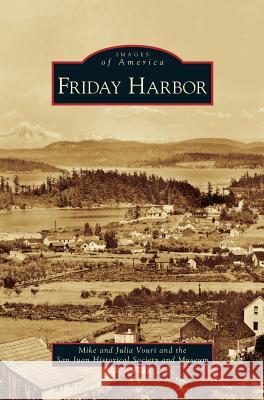Friday Harbor » książka
Friday Harbor
ISBN-13: 9781531637804 / Angielski / Twarda / 2009 / 130 str.
When Friday Harbor, Washington, was incorporated in 1909, some wanted the town's name changed. In a misunderstanding, the British had named it in 1858 for a shepherd named "Friday," who thought they were making introductions, not asking the name of the sheltered bay where he minded sheep. But the name stuck. As with many of the young state's small port towns, timber, salmon fishing, and farming fueled Friday Harbor's early economy. However, by midcentury, the lumber mill was gone, the introduction of irrigation in Central Washington swamped fresh produce markets, and the fish and pea canneries were shut down. Life slowed and some left, but in being passed by--until tourism caught on in the late 1970s--the town (and island) developed a unique sense of community that survives to this day.
When Friday Harbor, Washington, was incorporated in 1909, some wanted the towns name changed. In a misunderstanding, the British had named it in 1858 for a shepherd named "Friday," who thought they were making introductions, not asking the name of the sheltered bay where he minded sheep. But the name stuck. As with many of the young states small port towns, timber, salmon fishing, and farming fueled Friday Harbors early economy. However, by midcentury, the lumber mill was gone, the introduction of irrigation in Central Washington swamped fresh produce markets, and the fish and pea canneries were shut down. Life slowed and some left, but in being passed by--until tourism caught on in the late 1970s--the town (and island) developed a unique sense of community that survives to this day.











